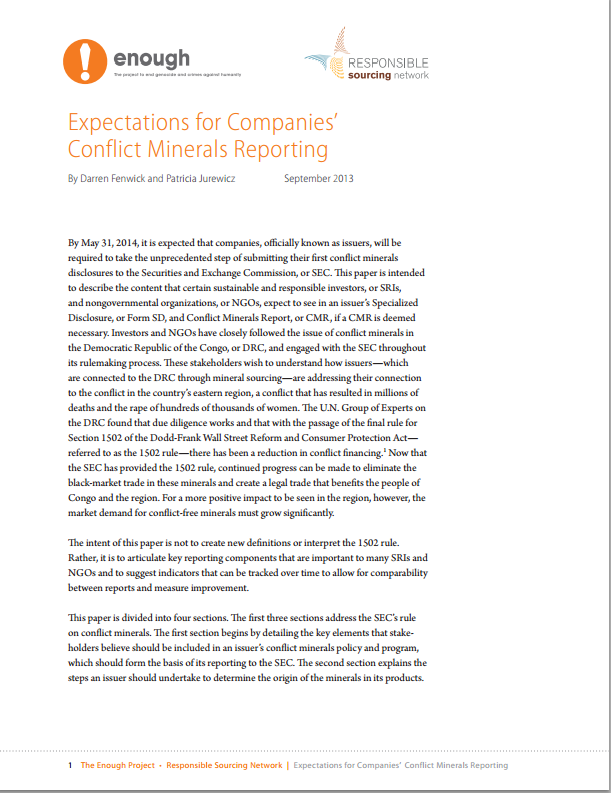
Section 1502 of the Dodd-Frank Wall Street Reform and Consumer Protection Act requires that companies, whose products may contain conflict minerals, file public reports about their supply chains that address minerals sourcing in their products. If, after companies have investigated their supply chain, the company realizes that their minerals originate in the Congo or its bordering countries, they must also issue a report reporting their due diligence. By May 31, 2014, it is expected that companies will be required to take the unprecedented step of submitting their first conflict minerals disclosures to the Securities and Exchange Commission, or SEC.
Today, the Enough Project along with the Responsible Sourcing Network released a report,”Expectations for Companies’ Conflict Minerals Reporting”, that articulates key reporting components that are important to socially responsible investors and rights groups who have been advocates for a clean minerals trade.
Tin, tantalum, tungsten, and gold – also known as 3TG – mined in eastern Congo are a major source of income for armed groups and end up in consumer electronics and jewelry. Dodd-Frank legislation pressures companies to examine their supply chains and identify if their mineral sourcing contributes to ongoing atrocities in Congo and the surrounding region; additionally, it provides consumers with greater accountability from the companies they support. Sustainable and responsible investors, or SRIs, and nongovernmental organizations, or NGOs, look not only for compliance but also a commitment to support a clean minerals trade in Congo. Enough Project co-author and Senior Government Affairs Manager, Darren Fenwick, states,
“Advocates for a clean minerals trade wish to understand how issuers, who are connected to the Congo through mineral sourcing, are addressing their connection to the conflict that has resulted in millions of deaths. Additionally, companies whose reports show compliance benefit from positive public sentiment and increased brand recognition.”
Adherence, improvement, and clarity in reporting is beneficial to both companies, and consumers. Issuers benefit from a positive public image, SRIs and NGOs can clearly identify the improvements, and mineral smelters feel increased pressure to ensure the minerals are conflict-free. Patricia Jurewicz, Director of Responsible Sourcing Network and co-author of the paper, adds,
“Investors would like to see their companies establish baselines the first year and specify the steps they are taking so we can then measure improvements in transparency and accountability reporting over time. Our paper provides a set of specific indicators that can be tracked to allow for comparability between annual reports.”
This report highlights important components for successful company reports, including :
- Constructing key elements of a vigorous company conflict minerals policy and steps for implementing a program
- Metrics that companies should track to effectively determine their actions to accurately assess the origin of their minerals
- Commitment to only using minerals from smelters that have been audited as conflict-free by a credible program such as the Conflict-Free Sourcing Initiative, as they become available; and
- Building a clean minerals trade by 1) Committing to sourcing conflict-free minerals from Congo and the surrounding region; and 2) Implementing OECD due diligence processes to determine if an issuer’s minerals are contributing to conflict.
Stakeholders also expect issuers to include any initiatives or activities they are undertaking or will undertake to support a clean minerals trade in Congo. The report also encourages issuers to take compliance beyond the 1502 reporting requirements, and to help create a peaceful and secure Congo by participating in diplomatic efforts and contributing to alternative livelihood projects in the region.
Read or download the full report.
Related Posts:

